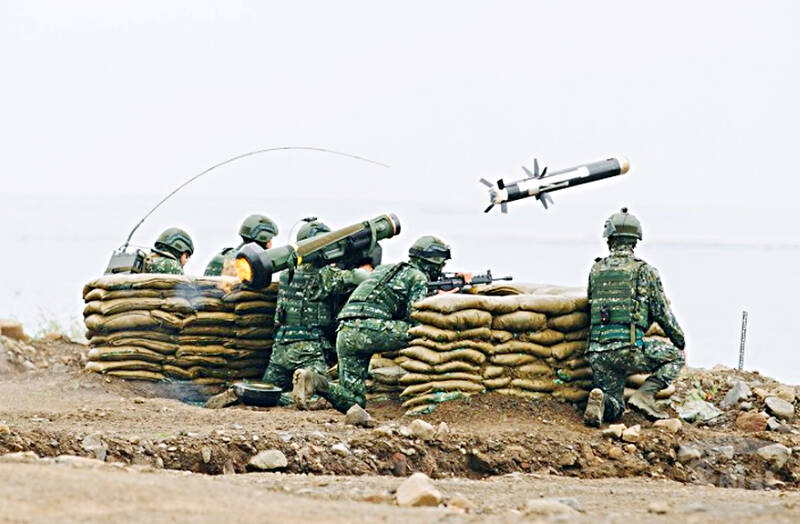The army is to receive 1,240 tube-launched, optically tracked, wire-guided (TOW) 2B and 200 Javelin anti-tank guided missiles next year, the Ministry of National Defense’s budget showed, in a sign that Taiwan’s arms orders were not affected by the war in Ukraine.
The army allocated a budget for 1,700 TOW missiles to be delivered between 2018 and 2025, and 400 Javelin missiles with 42 command launch units to be delivered between 2019 and next year, the ministry’s general budget for fiscal year 2024 submitted to the Legislative Yuan showed.
The schedules in the published budget are well within the timetables disclosed to the legislature at the time the deals were announced.

Photo courtesy of Military News Agency
The nation has received 460 TOW 2B missiles and next year’s shipments would complete the order.
Taiwan has received half of the Javelin missiles it ordered, with the rest to arrive next year if the legislature approves the army’s proposed NT$400 million (US$12.5 million) allocation.
The defense ministry’s general budget for fiscal year 2024 showed that it is to buy from the US 11 High Mobility Artillery Rocket Systems (HIMARS), which are to be delivered next year.
The proposed NT$6.85 billion budget would fund the procurement of artillery systems, two training simulators and 64 Army Tactical Missile Systems (ATACM) in addition to maintenance and operating costs, the ministry said in the document.
The acquisition would provide the armed forces with an artillery system capable of delivering long-range precision strikes against area targets and high mobility to repel an amphibious attack on the nation, the ministry said.
A tranche of 18 HIMARS, 864 Guided Multiple Launch Rocket Systems and 20 ATACMs are expected to be delivered by 2027 to replace a dropped bid for M109A6 self-propelled howitzers, it said.
With the new additions, the military can fire 114 full salvos of six rockets and 84 ATACM strikes, the ministry said.
The combined costs of the two arms packages and related maintenance were estimated to be NT$32.5 billion, it said.
Taiwan’s first group of 30 HIMARS operators and maintenance technicians are to be trained in the US and then return to become instructors, the ministry said, adding that it aims to create an indigenous capability to maintain the weapons.
Their training is scheduled to take place from February to October next year, the ministry said.
Meanwhile, the armed forces are to buy about NT$1.49 billion of helmets, bullet-resistant vests and ballistic plates in the next three years to equip conscripts who are expected to join the ranks following the reinstatement of the mandatory military draft, it said.
That figure includes NT$1.32 billion for the army, NT$47.7 million for the navy and NT$135 million for the air force, it said, adding that light arms and mortars would be purchased through a separate budget.
Additional reporting by Wu Su-wei

INVESTIGATION: The case is the latest instance of a DPP figure being implicated in an espionage network accused of allegedly leaking information to Chinese intelligence Democratic Progressive Party (DPP) member Ho Jen-chieh (何仁傑) was detained and held incommunicado yesterday on suspicion of spying for China during his tenure as assistant to then-minister of foreign affairs Joseph Wu (吳釗燮). The Taipei District Prosecutors’ Office said Ho was implicated during its investigation into alleged spying activities by former Presidential Office consultant Wu Shang-yu (吳尚雨). Prosecutors said there is reason to believe Ho breached the National Security Act (國家安全法) by leaking classified Ministry of Foreign Affairs information to Chinese intelligence. Following interrogation, prosecutors petitioned the Taipei District Court to detain Ho, citing concerns over potential collusion or tampering of evidence. The

‘FORM OF PROTEST’: The German Institute Taipei said it was ‘shocked’ to see Nazi symbolism used in connection with political aims as it condemned the incident Sung Chien-liang (宋建樑), who led efforts to recall Democratic Progressive Party (DPP) Legislator Lee Kun-cheng (李坤城), was released on bail of NT$80,000 yesterday amid an outcry over a Nazi armband he wore to questioning the night before. Sung arrived at the New Taipei City District Prosecutors’ Office for questioning in a recall petition forgery case on Tuesday night wearing a red armband bearing a swastika, carrying a copy of Adolf Hitler’s Mein Kampf and giving a Nazi salute. Sung left the building at 1:15am without the armband and apparently covering the book with a coat. This is a serious international scandal and Chinese

Seventy percent of middle and elementary schools now conduct English classes entirely in English, the Ministry of Education said, as it encourages schools nationwide to adopt this practice Minister of Education (MOE) Cheng Ying-yao (鄭英耀) is scheduled to present a report on the government’s bilingual education policy to the Legislative Yuan’s Education and Culture Committee today. The report would outline strategies aimed at expanding access to education, reducing regional disparities and improving talent cultivation. Implementation of bilingual education policies has varied across local governments, occasionally drawing public criticism. For example, some schools have required teachers of non-English subjects to pass English proficiency

TRADE: The premier pledged safeguards on ‘Made in Taiwan’ labeling, anti-dumping measures and stricter export controls to strengthen its position in trade talks Products labeled “made in Taiwan” must be genuinely made in Taiwan, Premier Cho Jung-tai (卓榮泰) said yesterday, vowing to enforce strict safeguards against “origin laundering” and initiate anti-dumping investigations to prevent China dumping its products in Taiwan. Cho made the remarks in a discussion session with representatives from industries in Kaohsiung. In response to the US government’s recent announcement of “reciprocal” tariffs on its trading partners, President William Lai (賴清德) and Cho last week began a series of consultations with industry leaders nationwide to gather feedback and address concerns. Taiwanese and US officials held a videoconference on Friday evening to discuss the